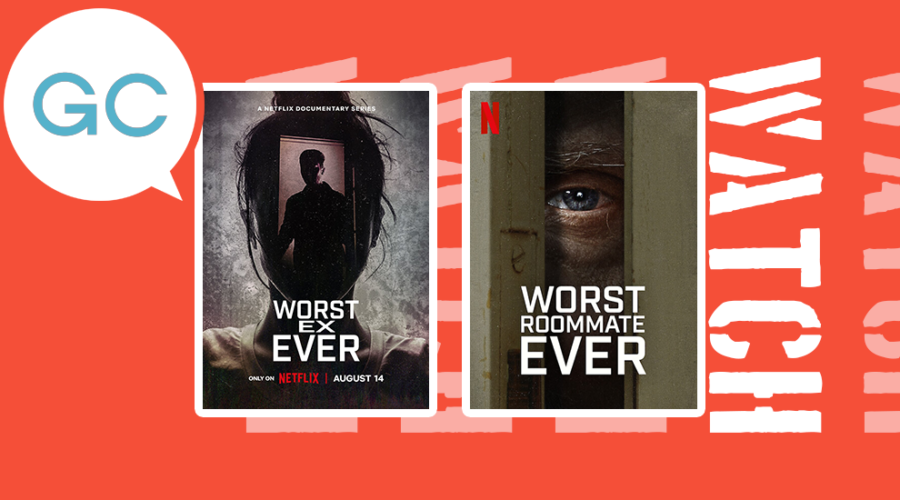True crime series like Netflix’s Worst Roommate Ever and Worst Ex Ever seem exploitative on the surface. I mean, just look at the titles! Obviously, they’re meant to appeal to the lowest common denominator!
But the genre of true crime itself can be deceptively profound. Under the mass market gloss, both of the series are characterized by compelling narratives about victimhood and survival. Too often, in true crime, we are presented with a story that centers the abuser or the killer. The victims become trophies in his or her (usually his, if we go by statistics, although Netflix impressively brings some stories of horrifying women to life here as well) menagerie. The story of what was done to them traps the victims like flies in amber.
What Netflix has done with these two titles is to reject the idea of centering the villain, avoiding the gross Ted Bundy effect, wherein we were all supposed to be impressed with the “brilliance” of a psychopathic killer who had an easy time zeroing in on women.
Instead, we get to see the victims turned survivors, and the people who care about them, reliving some of the worst days of their lives, even as they show us that they are greater and more interesting than the searing harm that was done to them.
As horrifying as these stories are — ”Dating the Devil”, the first episode of Worst Ex Ever, will probably stay with me for a long time — you’ll come away pretty damn impressed with many of their protagonists, and the self-reflection that they are able to go through before the unblinking eye of the camera.
I know what it’s like to tell graphic stories about my own life; I’ve had a number of incidents that, unfortunately, qualify me to do it. I once elected to do a tough NPR interview about my rape by a theater colleague and its grim aftermath, and the interviewer told me that I spoke as if I had a smile in my voice.
Of course I had a smile in my voice, humor and laughter is how I deal with stress, it’s my defense mechanism and, often, rhetorical weapon. Still, it was so hard for me to explain myself, and a terrible doubt crept in. What if I would be misread? What if the listeners would decide that I was a liar? I was staying with a friend in Manhattan at the time, and I could barely face the street for a few days after that.
So I am particularly impressed with how the men and women Netflix approached for these interviews are able to hold their own. Angie, one of the heroines of “Dating the Devil,” and the woman who heroically rushes to save her friend as her boyfriend is essentially torturing her to death, is the kind of friend that, I think, most women long for. She’s not just loyal, she’s a lion.
The story of Bo from “Burning Down the House,” which was shown as part of the second season of Worst Roommate Ever, is another banger.
Bo is not just the victim of betrayal and excruciating violence — he is very nearly failed by a justice system that briefly decides that his near fatal beating is actually the result of an accident. I wouldn’t have blamed Bo if he had been bitter as fuck on camera. Bitterness is a tricky way to connect a viewer to a story, however, and the greater takeaway from “Burning Down the House” is that Bo is a person with a great reserve of strength and a role model to the son of the criminal who intended to destroy Bo.
This is some hopeful true crime, and I prefer it to the corpse eaters that dominate a lot of the genre.
Of course, Worst Roommate Ever and Worst Ex Ever are sensationalist in tone — this isn’t True Detective. But sensationalism can be a powerful tool in and of itself. The more people binge watch, or even, in some cases, hate-watch this stuff (and I can genuinely say this was not a hate watch for me), the more they will actually get to learn about the signs and patterns that dangerous people can exhibit, and how the justice system has a very hard time cornering sophisticated and manipulative criminals.
Yes, it’s entertainment, but it’s entertainment with a purpose. And I know that as someone who has worked with plenty of victims of stalking. The lessons of Worst Ex Ever and Worst Roommate Ever are very similar to the kind of stuff I’ve told clients over the years: Believe people when they show you who they are. Do your best to never be alone with someone who has already victimized you, no matter how contrite they might seem. Cops may not take you seriously at first, but it’s still best to start a paper trail early.
And, more importantly: You are not defined by the bad thing that someone has done to you. It’s not on you, no matter how badly someone may want you to believe it. Believing you deserve to be safe — and I mean really believing it, in your heart, not just saying that you do — is the first realistic step toward safety.
Don’t skip it.

